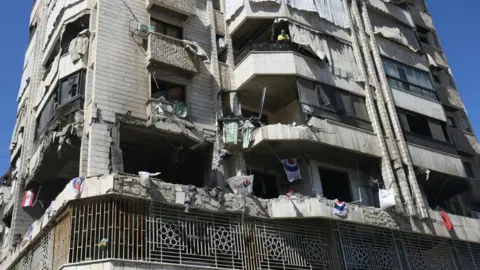 Getty Images
Getty ImagesIn the early hours of Thursday morning, a missile tore through a building in the heart of Beirut, far from where Hezbollah’s presence is strongest in the south.
Unlike for many of the other strikes targeting Hezbollah in recent days in Beirut’s southern suburbs, the IDF did not issue an evacuation order in advance.
Five members of staff and two volunteer paramedics at a health facility located in the same building were killed, according to the Hezbollah-linked civil defence agency – an emergency response organisation. Nine died in total, according to Lebanese authorities.
The Israel Defense Forces (IDF) said the strike “targeted terror assets of the Hezbollah terrorists organisation”.
BBC News teams went to the scene and tried to piece together what happened.
‘I ran out of the building’
“I felt that my heart was going to stop – it was pounding very, very loud,” one witness told the BBC.
The sound of the missile hitting the 12-storey building was heard across the Lebanese capital and smoke was still drifting into the air the following morning.
The building which was targeted is in Bachoura, a largely residential part of the city, and a matter of metres from the Lebanese parliament building.
It is more than 4km (2.5 miles) from Dahieh, where Hezbollah has a strong presence and which has been the focus of Israeli strikes in recent weeks – including the one which killed the group’s leader Hassan Nasrallah last week.
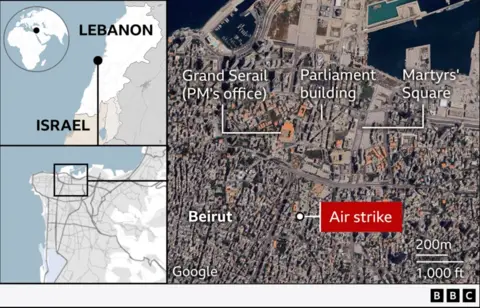
The IDF has carried out hundreds of strikes in Lebanon in the past one and a half weeks in an effort to dismantle Hezbollah’s leadership and ability to launch rockets, missiles and drones into Israel – something the Iran-backed group has done on an almost daily basis since Hamas, its Palestinian ally, launched a deadly raid into southern Israel almost a year ago, triggering the Gaza war.
Tens of thousands have died in fighting since, mainly Palestinians in Gaza, and dozens of strikes have targeted Beirut in recent days. And in Lebanon more than 2,000 people have died, according to the health ministry.
On the second floor of the Bachoura high-rise block, below several apartments, was a medical facility run by the Islamic Health Committee (IHC), which is affiliated with Hezbollah.
The group has a very extensive network of services that spans into supermarkets and schools. It provides medical care to people living in areas with a strong Hezbollah presence, who rely on its centres for treatment, medication and paramedics.
The missile hit one of these centres shortly after midnight.
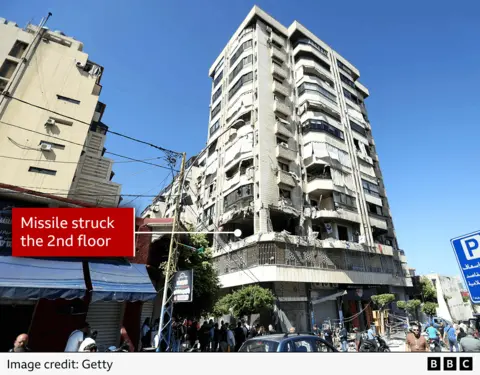
Witnesses said the area was busy at the time and as the sound of the explosion rang out, children began to scream.
Efforts to clear the rubble were still ongoing when BBC teams arrived at the scene on Thursday morning.
Medical equipment like gloves and masks were visible in the wreckage.
Hassan Ammar, 82, told the BBC he had been living in the building which was struck for 24 years with his wife and two daughters.
He characterised the health service housed in his building as “helping all the Lebanese” and “just like the Red Cross, but an Islamic one”.
“When we heard the strike, I ran out of the building with my wife and daughters, our apartment was severely damaged,” he said.
“This is a civilian facility – why would they target a civilian facility?”
The IDF has not commented on the Bachoura strike but has repeatedly said it does not target civilian infrastructure.
The following morning, Amin Sherri – a Hezbollah MP – arrived at the scene thronged by journalists.
In 2019, he was designated a financer of terrorism by the US Treasury, which accused him of threatening Lebanese bank officials and their families after it froze the accounts of a Hezbollah member.
The US also accused him of having “extensive ties” to Hezbollah financiers, and it released a picture purporting to show Sherri alongside the late Iranian general Qasem Soleimani, who was the head of the Revolutionary Guards’ overseas operation arm before he was killed in a US strike in Iraq in 2020.
Hezbollah is designated as a terrorist organisation in the UK, US and European Union.
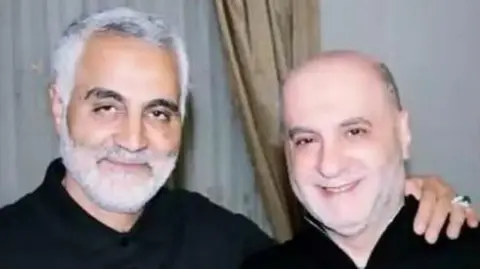 US Treasury
US TreasuryOn Thursday morning, Sherri held an impromptu news conference at the site of the strike and accused the IDF of deliberately attacking the medical facility.
He said: “We will continue this resistance and confrontation, and we will not abandon our responsibilities.”
Throughout the morning, there was chaos outside the devastated Bachoura medical centre – and a palpable sense of anger.
“As soon as we heard the air raid, we came out of the building running, children were screaming, sometimes you feel your heart is going to stop,” one man said.
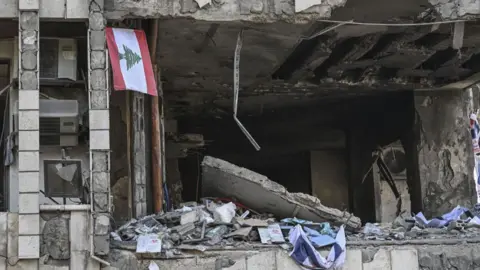 Getty Images
Getty ImagesHe insisted the medical centre served many locals and did not have a political or military function.
BBC News was unable to get access to the interior of the deserted building.
People who lived above the centre said they did not know where they would go tonight.
Kamal, a paramedic at the centre, said staffing had recently been increased in light of the fighting.
“This is why most of the casualties were medics,” he said. Some of those killed were sleeping when the missile hit, he said.
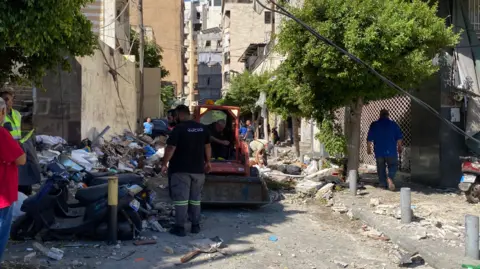
The strike in Bachoura was condemned by the European Union’s foreign affairs chief Josep Borrell, who said the IDF had “targeted once again healthcare workers”.
He said the strike had killed civilians in a densely populated area, and denied others access to emergency care, before characterising it as a violation of international humanitarian law.
On Thursday, the World Health Organization said 28 healthcare workers were killed in the 24 hours previous in Lebanon, and many more “are not reporting to duty” because they had been forced to flee.
Israel says it is necessary to take on Hezbollah in order for people in the north of the country to be able to return to their homes.
Additional reporting by Sean Seddon and Carine Torbey




